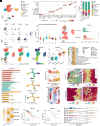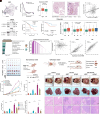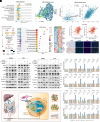Cancer-associated fibroblast-derived SEMA3C facilitates colorectal cancer liver metastasis via NRP2-mediated MAPK activation
- PMID: 40402249
- PMCID: PMC12130859
- DOI: 10.1073/pnas.2423077122
Cancer-associated fibroblast-derived SEMA3C facilitates colorectal cancer liver metastasis via NRP2-mediated MAPK activation
Abstract
Liver metastasis remains the predominant cause of mortality in patients with colorectal cancer (CRC). Nevertheless, the mechanisms underlying the initiation of colorectal cancer liver metastasis remain poorly elucidated. During the metastatic process of CRC cells from the primary site to the liver, we performed time-resolved analyses and identified a subset of tumor cells spatially located in the primary tumor and temporally distributed in the early stages of liver metastasis. These cells were termed liver metastasis-initiating cells (LMICs). LMICs exhibit high stemness, low proliferation, active interaction with surrounding stromal components, and a close association with liver metastasis. Notably, we found significant interactions between cancer-associated fibroblasts (CAFs) and LMICs via the SEMA3C-NRP2 receptor-ligand pair. Further in vivo and in vitro experiments confirmed that CAF-secreted SEMA3C could bind to the NRP2 receptor, which activates the MAPK pathway and promotes colorectal cancer liver metastasis. Our findings suggest potential therapeutic strategies for the early prevention of colorectal cancer liver metastasis.
Keywords: colorectal cancer; liver metastasis; metastasis-initiating; single-cell.
Conflict of interest statement
Competing interests statement:The authors declare no competing interest.
Figures






References
MeSH terms
Substances
LinkOut - more resources
Full Text Sources
Medical
Miscellaneous

